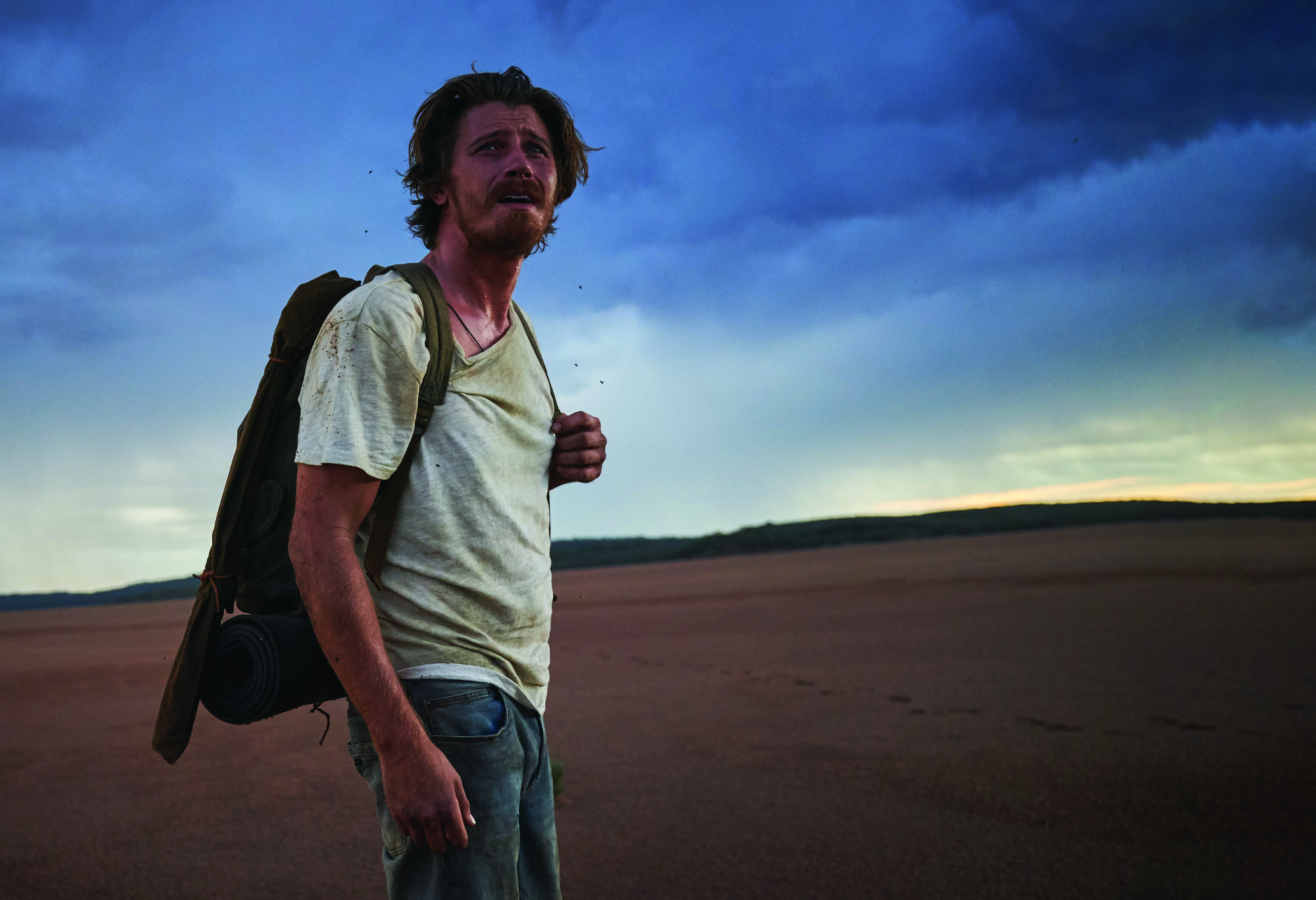In the canon of Australian literature, Tim Winton is up there with Peter Carey on the list of revered authors whose novels are most often dubbed ‘unfilmable’ (as if cinema isn’t capable of tackling complex and unwieldy ideas, non-linear narratives or impressionistic forms). Nevertheless, Dirt Music (2019) director Gregor Jordan – previously responsible for works including Ned Kelly (2003) and Buffalo Soldiers (2001) – was nervy about wrangling the poetic heft of Winton’s Miles Franklin–winning novel of the same name. A fan of the author and the book, he – much like Phillip Noyce, who had been attached to the project at one stage but left after having found it ‘difficult to translate’[1]Phillip Noyce, quoted in Edward Douglas, ‘Interview: Director Phillip Noyce Tackles Science Fiction with The Giver’, ComingSoon.net, 11 July 2014, <https://www.comingsoon.net/movies/features/119592-interview-director-phillip-noyce-tackles-science-fiction-with-the-giver>, accessed 17 August 2020. – wasn’t initially sure that the ‘unfilmable’ tag could be overcome.
‘I can remember being completely blown away, but having no idea of how to turn it into a movie,’ Jordan recalls, when we first meet a year and a seeming lifetime ago at the 2019 Toronto International Film Festival. Sitting down with me in a bar ensconced within the vast glass atrium of the InterContinental Hotel on a bright, balmy day, he wears a white V-neck T-shirt, with his sunnies placed on the table between us. ‘It’s less about plot and more about ambience and prose, and I just couldn’t really wrap my head around it,’ he admits. It was producer Finola Dwyer who convinced him otherwise; she showed him Jack Thorne’s screenplay, and he was hooked: ‘Jack had managed to corral this big, sprawling epic into a screenplay that actually hung together.’
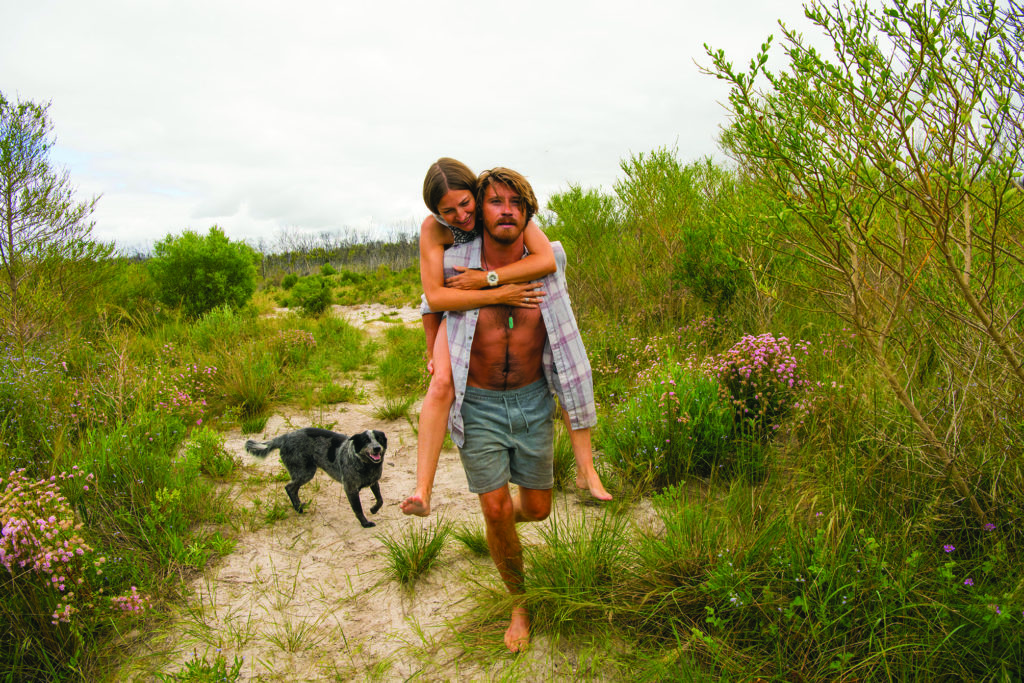
Dwyer was very keen for Jordan to be involved in the writing process. ‘So I spent a lot of time with Jack, and the three of us […] thrashed some ideas around.’ The thrashing lasted quite some time. ‘It was an ongoing process right up until the last day of editing, deciding what to put in and what to leave out.’
Mired in the dirt
Little could they (or I) have predicted how dramatically changed the world in which Dirt Music eventually emerged would be – and that the oncoming storm of the COVID-19 pandemic would derail the film’s planned release window in Australia until the month of this article’s publication. In a strange way, the separation from loved ones that many of us have undergone layers new meaning onto the film’s tale of dislocation.
Dirt Music opens withlonely ex-nurse Georgie Jutland (Kelly Macdonald) swimming naked in the ocean in the midnight blue before dawn. Lost in a listless, loveless relationship with fishing magnate Jim Buckridge (David Wenham), she soon finds some sense of belonging with grieving drifter Lu Fox (Garrett Hedlund), encountering him during that dip. He is nursing wounds from a family tragedy, but the complications of their igniting affair drive them apart physically. They seek to get to know one another better apart, each escaping to the place that meant the most to the other. For her, that means Lu’s ramshackle home beyond the town limits of the fictional White Point, on the Western Australian coast near Perth. For him, it’s a pilgrimage to the state’s remotest corners, where Georgie once found peace, and where he hopes to as well.
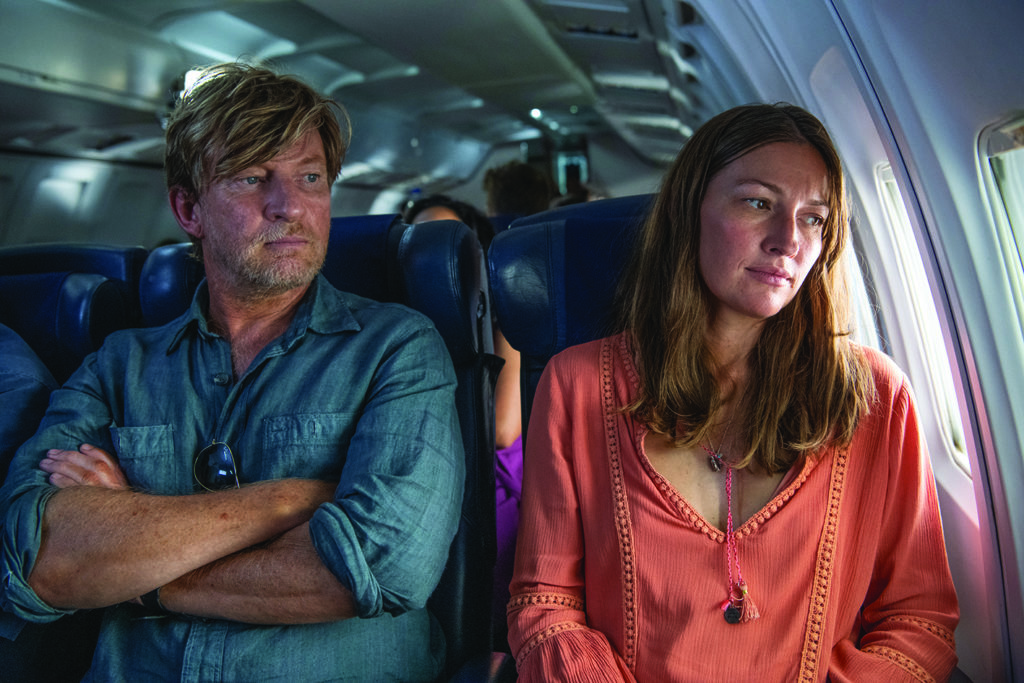
Speaking to Jordan again on the phone almost a year later, I note the strange similarities of the discombobulation we each find ourselves in. Jordan had been living in Los Angeles, but – with the crisis spiralling out of control in the United States – he and his family returned to the comparative safety of Auckland, where they are now in lockdown at the time of writing, as I am here in Melbourne. It’s hard not to associate these strange days with the film when I rewatch it, and he agrees: ‘That sort of sense of dislocation and isolation is very pertinent. People are cut off from their families and friends.’ The physical separation of Georgie and Lu is an unusual way to tell a love story, he adds.
They basically separate at the halfway mark of the film, and don’t get back together until the very end. So it’s a love story where the two lovers completely separate from one another. Their relationship exists through these surreal cues. She’s relating to him through all the things in his house and through recordings. And he’s relating to her via this extremely remote part of the world that she’s been to many years earlier.
‘One of the things that I really took from the book, and from Winton’s novels in particular, is this relationship with the land.’
— Gregor Jordan
In a rare interview Winton has given, in March 2003, he attempted to describe the sprawling, Booker Prize–nominated novel’s themes:
Regret. Grief. Coming to terms with self. It is hard for me to speak of themes. I like the reader to do that. Otherwise it feels like writing a 3rd grade essay on someone else’s work. But those are the big ones.[2]Tim Winton, quoted in Magdalena Ball ‘Interview with Tim Winton’, Compulsive Reader, 20 March 2003, <http://www.compulsivereader.com/2003/03/20/interview-with-tim-winton/>, accessed 15 August 2020.
For Jordan, much of the film’s soul comes from a strong sense of place, even in the face of great distance. ‘One of the things that I really took from the book, and from Winton’s novels in particular, is this relationship with the land,’ he says. The director worries that we treat the natural world as almost hostile – as something we have to tame, rather than live in harmony with.
Throughout this whole thing with COVID, people still have in the back of their minds that the environment is a big deal. And that that’s something we’re not going to be able to put off dealing with for too much longer. Certain elements of this crisis brought it into sharper focus.
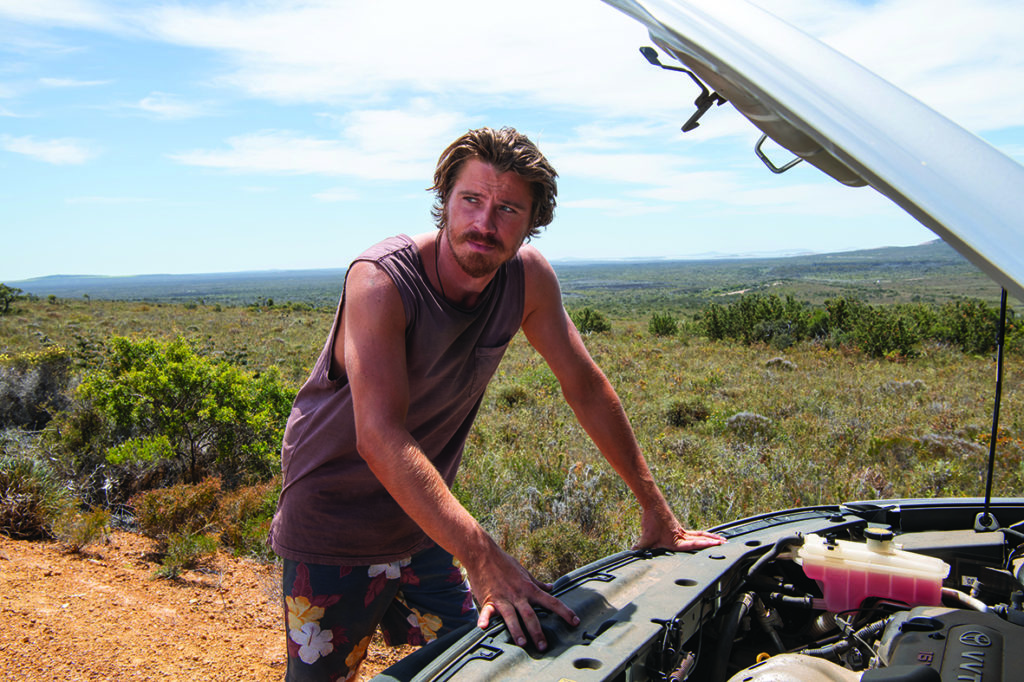
It’s a theme he held close to while filming, he says – ‘the fact that both these people have this very visceral relationship with the water and the land’ – noting that, at one point, Lu sends Georgie a love letter that is simply an envelope containing a handful of red dirt.
Dirt Music is a love letter to little-seen stretches of northern Western Australia, like the scattered landmasses of the Buccaneer Archipelago (including Sunday Island), and the rugged, rocky beaches of the Dampier Peninsula – the place where Warwick Thornton filmed his pilgrimage of sorts The Beach,[3]See Kenta McGrath’s ‘Sweet, Sour and Spicy Country: Isolation as Performance in Warwick Thornton’s The Beach’ in this issue of Metro, pp. 50–5. and which he has described as a place of healing: ‘There’s a point where you really need to realign your mind, body and soul and have a conversation with yourself.’[4]Warwick Thornton, quoted in Stephen A Russell, ‘On the Beach at the End of the World with Warwick Thornton and His Unruly Chooks’, SBS Movies, 22 May 2020, <https://www.sbs.com.au/movies/article/2020/05/18/beach-end-world-warwick-thornton-and-his-unruly-chooks>, accessed 16 August 2020.
Jordan and his crew had to gain the respect of the land’s rightful owners, the Angus family of the Bardi Jawi community, to shoot in spots no filmmaker had been allowed to before. Paying due respect to the land and to the First Nations is baked into Winton’s writing, Jordan suggests, and he was committed to getting it right:
And that was a process, you know. That wasn’t just turning up and asking for permits. It involved getting to know the family and them explaining to us what the land meant. Educating us on where we could go and where we couldn’t. Because there were many sites that were considered law grounds, burial or initiation sites, sacred places.
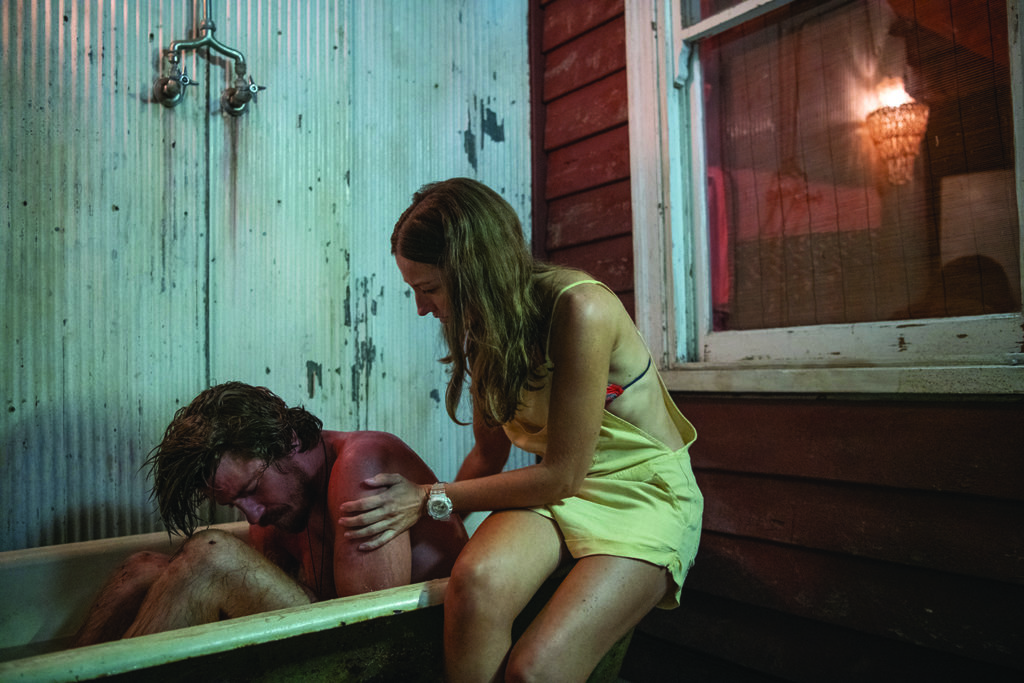
It was a humbling experience for Jordan and his cast and crew, including cinematographer Sam Chiplin and water cinematographer Rick Rifici. ‘This is an ancient place that has real significance to the traditional owners, who have literally existed there for tens of thousands of years,’ Jordan says. ‘You’re in their house.’
The production would necessitate building a hut on Sunday Island. This delicate proposition required sensitive handling, given that the Angus family had made it clear that the team could not remove any rocks from the land without risking the health of their matriarchal elder. ‘She was the most connected to the ancestors,’ Jordan says. ‘They believe the spirits of the ancestors are inside that land.’
The Angus family asked Jordan to explain what the film was all about, and why they should allow him to shoot it on their land. When the director outlined that Lu is haunted with grief over the loss of his loved ones, and that they appear to him in ghostly visitations, it struck a chord: ‘They’re all nodding their heads going, “Yep, that happens.”’ The traditional owners immediately understood Lu’s decision to travel to this spot in his quest to make peace with the past. ‘They went, “Well, this is the place,”’ Jordan relays.
While the locations astound, they presented significant filming challenges, Jordan says, including figuring out how to wrangle equipment in a remote location. ‘There was a lot of scratching of heads going on,’ he says. ‘That was such a long process, just working out the logistics.’ Shooting on digital cameras, predominantly handheld and with vintage anamorphic lenses, they worked for the most part with natural lighting, rolling with rapidly shifting weather patterns. As Chiplin outlines in the film’s production notes, their surrounds assumed character status, and influenced how they captured Macdonald and Hedlund too:
We always bring the location in and let it have an influence on the character’s psychology. One of the best ways to achieve this is by not doing too much, and making the images feel gritty and raw, [so] you can relate to the characters […] There’s a tactile feeling of when something’s explained to you in Winton’s work […] that gives you a magical feeling that you can’t help but internalise.[5]Sam Chiplin, quoted in Wildgaze Films & Aquarius Films, ‘Production Story’, Dirt Music press kit, 2019, p. 5.
‘It just [became] this amazing experience,’ Jordan says of the rigorous but rewarding shoot. The folding in of flashback sequences involving Lu’s family and the tragedy that strikes them also presented obstacles and opportunities, as well as another way to learn from the Angus family. ‘We in Western societies measure time in a very linear way, whereas a lot of Indigenous people think of it more as cycles,’ Jordan observes. ‘For instance, the people up there think in terms of tides.’
He was reminded of protagonist Úrsula’s observation in Gabriel García Márquez’s One Hundred Years of Solitude that ‘time was not passing […] it was turning in a circle’.[6]Gabriel García Márquez, One Hundred Years of Solitude, trans. Gregory Rabassa, Penguin Books, Camberwell, VIC, 2009 [1967], p. 341. ‘That’s something that’s always stuck with me,’ the director says, a quality he admired both in Winton’s writing and Thorne’s deft navigation of these swirling eddies. ‘I thought Jack did a really great job of translating that and putting it into some sort of coherent, shootable form.’
The editing suite threw up more hard work. ‘I gotta say that post-production on the film was gruelling,’ Jordan levels. ‘You can have this abstract stuff floating together, but, at the same time, a modern audience does demand that things link up.’
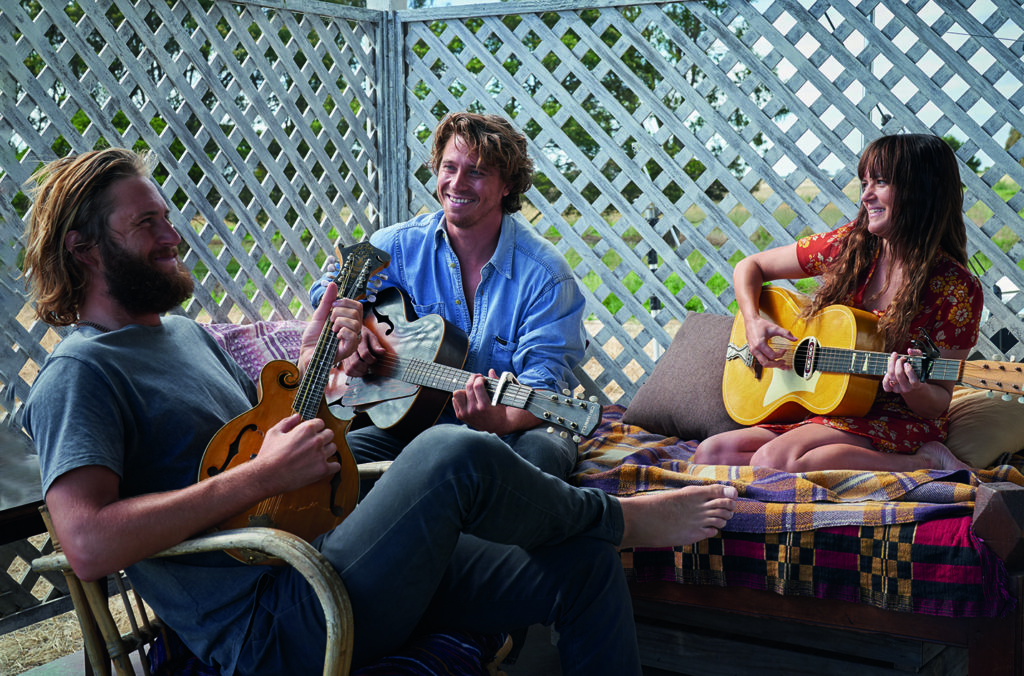
My guitar gently weeps
As the title would suggest, music is also key to unlocking Winton’s lovelorn song of a novel. Glaswegian Craig Armstrong composed the swelling score, but the casting of Hedlund was also pivotal in finding the right sound for the film. ‘There were certain actors we spoke to [who] we thought would have been fantastic in the role, but they didn’t think they could handle the music,’ Jordan reveals. Hedlund was not at all intimidated.
When I first met with him, almost the first thing he did was pull out his guitar and start playing all these songs that [he’d] written after reading the script. So, musically, the material really inspired him. And that was a very important element in the casting of Lu. This is a guy who has music inside him, and that’s sort of the biggest torture. It’s too painful for him to sing and play again because of what’s happened.
There is a beautiful nod to the traditional owners of the land on which they shot, too, in the way that Lu reconnects with his guitar and the haunted music and painful memories he holds balled up tight within himself.
Australian indie musician Julia Stone plays Lu’s sister-in-law in the flashback sequences. She was a natural fit, Jordan says. They knew she could sing, but were equally impressed by her acting performance when she sat for a reading. Likewise, he knew Home and Away alumnus George Mason, who plays Lu’s brother, could act, but he was seriously impressed by his singing, too. ‘He just happened to have this beautiful, angelic voice.’ On Stone’s suggestion, an Airbnb was booked for a week in Melbourne for her, Hedlund and Mason to bunker down, get to know one another and jam on their guitars, Jordan says. ‘At the end of that week, they had a whole lot of songs they could bang out, and they became close friends as well.’ With that came a believable familial chemistry that lends greater heartache to what befalls the characters.
‘I haven’t spoken to Tim since [we completed the film]. He’s a very private person. I guess I’m curious. It must be strange for an author to see their work reinterpreted.’
— Gregor Jordan
It’s not unusual for an Australian film to import a big-name actor from overseas, but more so perhaps for one to do so for both leads, as was the case with the Scottish Macdonald and American Hedlund. Macdonald’s accent work is strong, and Lu’s a surly, monosyllabic type who doesn’t say much anyway, making Hedlund’s job easier. Jordan insists that the production was open to Australian leads, but that it just didn’t work out that way: ‘We had really great [local] actors wanting to do it, but then we couldn’t find them in the right combination, available at the right time.’ The remote location work in 40-degree heat, and the fact that the stars had to camp out in safari tents for long stretches, compounded the complications of the talent hunt. ‘Dirt Music wasn’t a big-budget film, and we were shooting in places that weren’t easily accessible, where you can’t take your kids for three months,’ he relates. In any case, the director doesn’t see this casting approach as an issue: ‘When Cate Blanchett played the Queen of England, no-one batted an eyelid.’
There will always be critics, but was Jordan worried about Winton himself? ‘I haven’t spoken to Tim since [we completed the film]. He’s a very private person,’ he says. ‘I guess I’m curious. It must be strange for an author to see their work reinterpreted.’ Otherwise, Jordan has long since learned to let go of a film once it’s in the can, and is no longer obsessively reading reviews. ‘In a way, it’s not yours anymore,’ he remarks. ‘When you make a film and send it out there, that’s sort of it, for better or for worse.’
Perhaps, like the lovers at the heart of Dirt Music, it’s wisest to find peace with oneself? ‘I guess there’s going to be fans of the book going, “Why didn’t he do this? Why did he do that?”’ Jordan says. ‘And that’s just the way it is.’ He recalls a time that he worried too much, shortly after wrapping Ned Kelly. Good friends with Powderfinger frontman Bernard Fanning, he confided to the singer that he had no idea whether it was a good film or not. He’ll never forget Fanning’s response, which is as good a life guide as any novel, ‘unfilmable’ or not:
That’s how I feel when I finish an album, before it’s been released. But one thing I’ve learned is that it doesn’t matter how good it is. Someone out there is going to fucking hate it.
Endnotes
| 1 | Phillip Noyce, quoted in Edward Douglas, ‘Interview: Director Phillip Noyce Tackles Science Fiction with The Giver’, ComingSoon.net, 11 July 2014, <https://www.comingsoon.net/movies/features/119592-interview-director-phillip-noyce-tackles-science-fiction-with-the-giver>, accessed 17 August 2020. |
|---|---|
| 2 | Tim Winton, quoted in Magdalena Ball ‘Interview with Tim Winton’, Compulsive Reader, 20 March 2003, <http://www.compulsivereader.com/2003/03/20/interview-with-tim-winton/>, accessed 15 August 2020. |
| 3 | See Kenta McGrath’s ‘Sweet, Sour and Spicy Country: Isolation as Performance in Warwick Thornton’s The Beach’ in this issue of Metro, pp. 50–5. |
| 4 | Warwick Thornton, quoted in Stephen A Russell, ‘On the Beach at the End of the World with Warwick Thornton and His Unruly Chooks’, SBS Movies, 22 May 2020, <https://www.sbs.com.au/movies/article/2020/05/18/beach-end-world-warwick-thornton-and-his-unruly-chooks>, accessed 16 August 2020. |
| 5 | Sam Chiplin, quoted in Wildgaze Films & Aquarius Films, ‘Production Story’, Dirt Music press kit, 2019, p. 5. |
| 6 | Gabriel García Márquez, One Hundred Years of Solitude, trans. Gregory Rabassa, Penguin Books, Camberwell, VIC, 2009 [1967], p. 341. |
